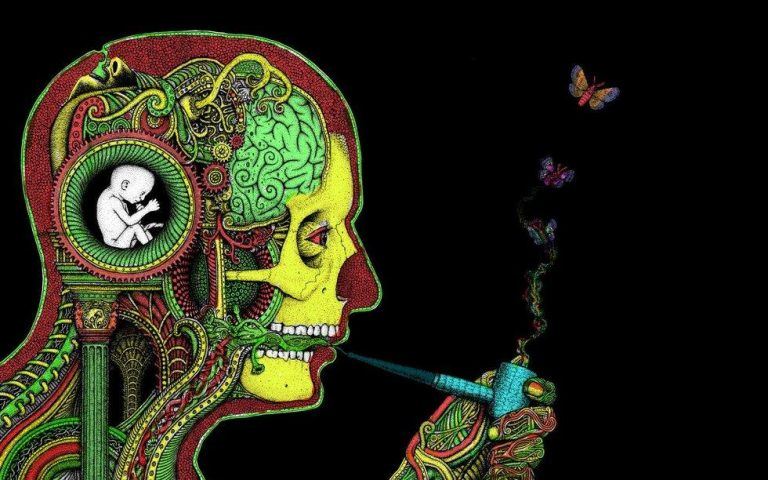The belief that weed kills brain cells has been long held by critics of the plant. Attempting to verify or refute these claims has been difficult due to conflicting studies.
Some research suggests that cannabis might be bad for adolescent brain and adult brains, but is the research substantiated? Has the research created a consensus in the scientific community about the affects of marijuana on the mind?
Is it true? No.
If that was the case, most of you reading this would probably be drooling vegetables by now.
The human-vegetable example may not work on relatives, supervisors, or college professors who view your intellect with gross disdain simply because you puff on occasion (or all day, every day).
Thankfully, we got some real, solid science you can cite next time your marriage to mary jane is called into question by some strait-laced square.
History Time: The Bogus Rhesus Monkey Experiment
The brain-damage thing gained traction in the ’70s after President Richard Nixon – determined to crush the herb-loving, anti-war Black Power Movement and its white hippie allies – rigged federal research to show, with ‘scientific evidence,’ that smoking weed kills brain cells.

To do this, the Nixon administration convinced psychiatrist Robert G. Heath to conduct the infamous rhesus monkey experiment. In the so-called study, Heath took a bunch of monkeys, strapped gas masks to their faces, and then pumped so much marijuana smoke into the masks that asphyxiation and carbon monoxide poisoning caused the monkeys’ brain cells to die.
At the time, only the study’s results were released to the public.
How Heath manipulated the experiment to please President Tricky Dick was kept secret until 1980, when Playboy and NORML got a hold of the full rhesus monkey study report. (By the way, no self-respecting scientist ever keeps their experimental methods a secret.)
Nixon’s shiny new National Institute of Drug Abuse (NIDA) spent years using Heath’s fabricated study to promote the idea that smoking weed killed brain cells, a myth that hit its zenith in the 1980s during Nancy Reagan’s ridiculous “Just Say No” anti-drug campaign.
Today, we should just say no to the silly notion that weed kills brain cells. For starters, there are way too many hyper-intelligent people who’ve admitted to regularly smoking cannabis.
Examples: if weed killed brain cells, then how did astronomer Carl Sagan receive the Public Welfare Medal in 1994, the National Academy of Sciences’ version of the Oscar? Or how did author Maya Angelou win a Pulitzer, a Tony, and three Grammys in her lifetime? And how did Snoop Dogg come up with all those velvety smooth rhymes?
What the Science Really Says
First, let’s take a moment to address the notion that marijuana use leads to lower IQ. This idea came from a research paper which looked at data from a longitudinal study done on 1000 people from Dunedin, New Zealand. The study followed subjects from age 13 to 38 and conducted IQ tests a both these ages. The findings revealed that people who were chronic users of marijuana, which are those that had a physical dependence to the drug, before the age of 18 had a drop in IQ of 8 points by the age of 38.
There are three important things to note about this study. First, the people who were shown to have a decline in IQ are significantly small – 38 out of 1000, or 3.8 percent. Second, these individuals were using significantly more marijuana (four days per week) than the average marijuana user. Finally, they were using more marijuana consistently for much longer (20 years) than the average marijuana user.
Moreover, follow up studies of this data have shown that differences in socioeconomic status may account for the differences in IQ found in the study, not to mention the discussion surrounding IQ as a valid measurement of brain function and intelligence which are beyond the scope of this response.
In terms of marijuana and its effects on brain cells, or neurons, there is little evidence to suggest that any of the active ingredients in the marijuana plant administered at doses appropriate for human consumption have neurotoxic effects.
This is in direct contrast to alcohol, where the body’s digestive process creates metabolites such as acetaldehyde and other “reactive oxygen species” which are toxic to the brain and other cells in the body. This is why you have a hangover, after drinking large quantities of alcohol.
The active ingredients in the marijuana plant, called phytocannabinoids, affect specific receptors within the body. In fact, the body produces its own set of cannabinoids called endocannabinoids and has an endocannabinoid system which regulates the activity of all cannabinoids in the body.
There are two types of receptors within the endocannabinoid system CB1 receptors and CB2 receptors. CB1 receptors are located primarily in the brain and nervous system, while CB2 receptors are located primarily in the immune system.

The fact that these receptors are located all over the body is part of the reason why marijuana has been found to be useful for so many different medical conditions.
Specifically in the case of seizures, there is preliminary research which shows that the cannabinoid, cannabidiol or CBD, raises the threshold for seizure activity within the brain making it overall more difficult to have seizures, and thus providing hope to many parents of children with intractable seizure disorders. There is also some preliminary research which show that other cannabinoids within the plant actually protect brain cells from damage associated with Alzheimer’s disease. However, much more research needs to be done in order to make definitive claims on the medical benefits.
The evidence at this point indicates that marijuana does more good than harm when it comes to its effects on the adult brain.
In 2016, Duke University conducted one of the many studies showing that cannabis use doesn’t harm the brain. The researchers followed identical twins — who are essentially genetic clones of each other — for 10 years. Among each twin pairing, one smoked weed and the other never touched the stuff. No differences were found between their neurocognitive functioning, even after one twin spent a decade blazin’.
But the Duke study only looked at outward, observable behaviors between the twins. How does a toker’s actual brain look compared to a non-toker’s?
In 2015, scientists at the University of Colorado-Boulder used high resolution MRI scans to compare the brain volumes, shapes, and structures of weed smokers and non-smokers. Guess what the researchers found? No differences between the brains. Zilch. Nada. Pot-laden brains looked just like the straight-edge ones.
So what can we draw from these two studies? Weed doesn’t appear to kill brain cells, but it also doesn’t make anyone smarter, either.
But What About All Those IQ Studies?
The prohibitionists’ favorite ‘stupid-pothead’ argument is that cannabis use lowers IQ scores. But first, a word on IQ, otherwise known as the “intelligence quotient.”
IQ only measures a specific kind of intelligence, namely, one’s ability to detect and exploit patterns within the narrow scope of word games and 3D mind puzzles. IQ can reasonably predict an individual’s success in certain fields, like science, business, or computers, but that’s pretty much it.
Over the years, psychologists and neuroscientists have determined there are several types of intelligence: star athletes demonstrate kinesthetic intelligence, artists exhibit aesthetic intelligence, musicians play off their own kind of smarts, and so on and so forth. Today’s IQ tests are useless for predicting anything in these other important disciplines.

Furthermore, the inventor of the IQ test, French psychologist Alfred Binet, never intended his test to serve as a measuring stick for someone’s higher intellectual capacities. He used it as a tool to help him diagnose mental dysfunction in his child patients.
Here’s what Binet had to say about his own test: “The scale, properly speaking, does not permit the measure of the intelligence, because intellectual qualities are not superposable, and therefore cannot be measured as linear surfaces are measured.”
In other words, human intelligence can’t be reduced to a single number because it’s too complex.
Anyway, you came here for scientific ammo. In 2018, researchers at the University of Arizona looked at 1,989 twins in England and Wales. Like the Duke University study above, they found no IQ differences between the twins when one smoked weed and the other didn’t.

Commenting on the Arizona study, drug researcher Ian Hamilton at York University told the Daily Mail that low-IQ teens are more likely to smoke weed because it stimulates their minds, which may explain why some psychologists notice lower IQ scores with tokers.
Regardless, the science certainly says smoking weed will screw with our short-term memories, as anyone who’s hit a bowl and then spent an hour looking for their car keys (which was in their hand the entire time) can attest to. But that’s about it.
Does it really matter if you can remember LeBron James’ NBA stats from the 2003-2004 season? No, it doesn’t, especially when weed can help any culdesac baller become a better player.
Just remember to consume responsibly, and your body — and your brain — will thank you for it later.





